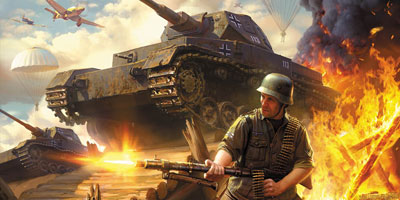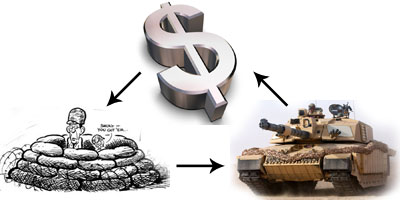Yep, you heard right. Rushing is for noobs. Why should such a brainless and simple strategy overcome your brilliant setup for a large, upgraded army and well defended base? While you plan ahead and think hard how to come up with a plan to defeat him, the bastard comes along and attacks you immediately. Of course, the real thinker would anticipate a rush and come up with a strong defensive plan from the start to counter that rush. He would, while defending from the mindless spam, form up a large army for a strong and effective counterattack to take the rusher out in one fell swoop. OK, enough fun. Seriously, rushing is definitely not for noobs. Then why do some players think it is if it just isn't?
What is rushing?
Rushing is a general concept and tactic in many games, although this article narrows it down to its meaning in real-time strategy. A rush is a fast attack, intended to overwhelm the opponent, preferably when he's unprepared. The rusher sacrifices his economy in order to train units fast, allowing him to attack the enemy early on in the game. The intent is to overwhelm the opponent by swarming him before he can defend himself or even attack you by rushing. The rusher opts for a quick strike, instead of focusing on expansion, defense or advancing up the tech-tree. Rushing is not without risk, because if it fails and not enough damage is dealt, the rusher is usually put at quite a severe disadvantage, having sacrificed his economy for the rush. The real-world analog of rushing is the
blitzkrieg, a strategy or doctrine most famous for its application by the Germans in the Second World War. The blitzkrieg (translate: "lightning war") focuses on speed and surprise, to crush an enemy before he can mobilize his forces for defense.
Rushing is one of the three main strategy concepts in real-time strategy games. The other two are
turtling and booming. Turtling is highly defensive, revolving around building up defenses to protect the main base while occasionally harassing the enemy. Ultimately, a large army is sent out with the intent to take out the opponent in one fell swoop. Booming is a strategy focusing on economic expansion, using a superior economy to advance up the tech-tree faster and create a more technologically and numerically superior army.
Seen fully black and white, rushing defeats booming, booming defeats turtling, and turtling defeats rushing. Rushing defeats booming because he doesn't have the defense to defeat the enemy's rush while his economy gets destroyed. Booming defeats turtling because there is very little offense and the player that is booming will acquire a superior economy, defeating his opponent via this tactic. Turtling defeats rushing because the defense will defeat the rush and set the rusher at a disadvantage. Now, this is of course all black and white. In practice, a player uses a combination of all three tactics, one to a larger extent than the other, depending on the game, and the skill and style of the player.
Is rushing "noob"?
You must have all experienced it at some point. You rush a player and he cries out in anguish, calling you and your mother all sorts of things even the writers of South Park would shy away from. Is there something wrong with rushing? Is it lame, simple and void of skill? No. It is actually the most complicated and difficult one out of the three tactics illustrated above.
First of all, booming or focusing on economic expansion is easy. Anyone can do it. Hell, even a six-year old could do it. It doesn't require any experience whatsoever. Why? Because investing in your economy to get more resources back is highly intuitive. It's natural, logical and simple. Of course there is more to it. However, at its core, booming is easy as there is no interaction with your opponent(s).
Secondly, turtling is a bit trickier than booming, but hardly that much more. You hardly expand, because if you did, you couldn't turtle. Defenses are expensive and cost time to set up, so you can only defend a small area. You hardly attack, because you don't focus on training units for harassment, skirmishes and army confrontation. You invest in defenses to protect your base. Since your defenses do most of the work, you also don't have to micromanage a lot. That seriously cuts back on how much you have to think about issuing orders. When turtling, you can easily sit back, eat a sandwich or even take a leak in the extreme case. If that isn't easy anymore, then what is?
Finally, rushing is definitely a lot more difficult than the above tactics. You have to sacrifice your economy and the defense of your base to attack him. At the same time, you have to expand to keep your rush going and if your opponent is also attacking you, you
also have to pay attention to your base. That's already three things that you have to do, but that's not all. No, not by a mile. You also have to make the right decisions. When do I expand? Where do I expand? What units do I buy? Where do I send unit x, y and z? Should I put more pressure on him? Should I fall back? Should I buy more units? That should make it clear to you: rushing = thinking. It's using your brain to best of its abilities. That doesn't apply to booming or turtling. Then why do some consider it noob?
Why do some consider rushing "noob"?
Despite the fact that rushing is clearly one of the more difficult concepts and strategies of real-time strategy gaming, there are still plenty of players that "run to Mommy" whenever you rush them. There are even the infamous "10 min no rush" games, in which a rule is agreed upon that neither player attacks the other for at least ten minutes. Why is rushing so unpopular, even hated, in some circles?
One of the main reasons comes down to inexperience. Newbies, upon learning the very basics of the game, will not immediately resort to risky strategies that could cost them the game if they're unsuccessful. Rushing is risky, whatever else it may be. You sacrifice a good economy and a strong defense by rushing, which initially goes against all logic. Of course you want to keep your base safe and develop a strong economy so you can defend better and eventually attack better.
Rushing is also difficult or better said, more difficult than booming or turtling. As a new player, you'll apply what you understand. Turtling and booming are easy and therefore, a newbie will most likely apply those strategies. You may not even know how to rush and even if you tried, a more experienced player will outpace you. He will know a faster build order, all the hotkeys and he's much faster at micromanagement. That can be quite discouraging and to counter the enemy's rush, you turn to turtling.
However, that still doesn't really explain why they complain. It is clear why newbies don't rush or at least not well, but why do they retaliate?
- Inexperienced players are not always aware of their lack of skill. They may think they know how to play and what's "fair". They expand, they construct defenses, train a few units and along comes a rusher. That rusher messes up their entire strategy, destroys his economy and after a struggle, the game is over. To the "rushed" player, it seems like quite a lame strategy.
- If a "noob" tries to rush, but his opponent is faster at it, he could conclude his enemy is cheating. How could he be faster than his fastest strategy? He must have used some trainer or hack to get his buildings or units to construct/train faster.
- Then there are the campers, the turtlers. They need to set up defenses and that takes resources and time. When such a player is rushed, in almost every case, the rusher arrives a long time before the camper is ready with his defenses. Because this seriously compromises the strategy of the camper, his frustration peaks and he lashes out. This is also the main reason for the existence of the "10 min no rush" games.
- Finally, if a rush is successful, the player that got rushed has obviously lost or is in bad shape. Inexperience or not, there are always plenty of gamers that just have bad sportsmanship and retaliate by complaining about being rushed. It's very simple. They lost, they hate it, they retaliate with words. Aside from this last reason, if you think back to your humble beginnings as an online gamer, you may recognize something here.
Summary
Rushing: what is it, is it really "noob" and why is it so ferociously hated by some?
- The intent of rushing is to overwhelm the opponent with a fast, coordinated attack.
- Rushing, turtling and booming are three main concepts in RTS gaming. Seen in black and white, each counters the other. In practice, a combination of all three is used.
- Rushing is the most difficult of the three. Why?
- Booming or economic expansions is easy. It requires no interaction with your opponent, it is logical and it is intuitive.
- Turtling is no different. You don't expand a lot, you don't attack a lot and your defenses do all the work for you. Once your defense is all set up, you could even go to the bathroom during the game.
- Rushing requires all your attention. In your base and in his base. You have to think about every possible aspect. Examples are: When do I expand? Where do I expand? What units do I buy? Where do I send unit x, y and z?
- Why is rushing considered "noob"?
- Inexperience is the main factor. Rushing is risky and newbies resort to simple and safe strategies.
- Rushing is difficult and an experienced player will easily outpace you, so a newbie resorts to turtling to counter the enemy's rush.
- "Noobs" may complain because they cannot comprehend the skill behind a rush. They may also be unable to understand why someone can be so fast or they could simply be poor losers.
Discuss this article in our forums.




